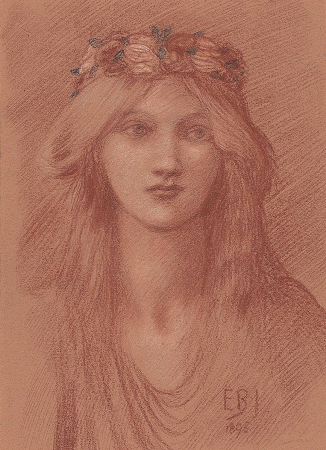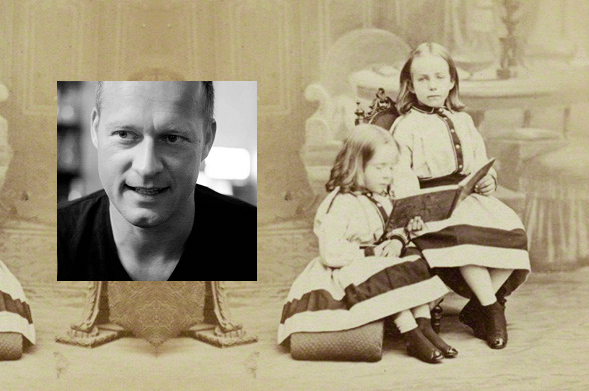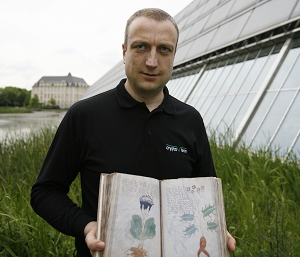Blog reader Christof Rieber has sent me a potential solution of a major crypto mystery: the encrypted passages of Lady Gewndolen’s diary. Is Christof’s deciphering attempt correct?
Lady Gwendolen Gascoyne-Cecil (1860-1945), daughter of British Prime Minister Robert of Salisbury (1830-1903), was not only a member of a prominent family, but also wrote a successful book about her father.

Source: Wikimedia Commons
As blog readers Ralf Bülow and Richard SantaColoma kindly pointed out to me, Lady Gwendolen also left behind an unsolved cryptogram in her (otherwise unencrypted) diary. The lady wrote the message in question in the year 1888, which went down in German history as the Year of Three Emperors. Here it is:
S[alisbury]’s political anxiety is enormously increased by a conversation he had with 465113, 49359 — just 54461 415211 A & 55154 — is so 39751 30939 the 62818 562412 has been 60313 that 525210 the first 62041 562412 will 47651 497316 her 52062 will be 59941 60633 and yet 546410 477316. S[alisbury] could hardly believe his ears and was still more horrified when he gathered that 535611 58955. During 443513, 41463, always 39869 39869 31763 43447 and family and 48811 seems 50458 29911. From what S[alisbury] knows 457316 434447 336318 43168 thinks 43447. 33145 497316 anything, though this 50741 34942. He does not think that 562412 63131 58453 if she 60633. Doubtful how far 43447 45147 over 44148 40012 even now, and if he should 35234 S thinks 48355 36946 incapable 497316 424219 & 47651 — 539620.
As an be seen, most of the diary entry is in the clear, while only the most important expressions are encrypted.
Christof Rieber’s solution
A few days ago, blog reader Christof Rieber sent me a possible solution. According to Christof, the plaintext might read as follows:
Salisbury’s political anxiety is enormously increased by a conversation he had with Bismarck, Friedrich – just crowned as a regent – is so sick that the Emperor’s lady has been announcing that Augusta, the first married lady, will abdicate of. Her grandson will be the successor and yet got empowered. Salisbury could hardly believe his ears and was still more horrified when he gathered that Wilhelm I died. During conversation, Robert, always spoke. Spoke about Wilhelm II and family and he seems very upset. From what Salisbury knows of Wilhelm II, sister Victoria thinks Wilhelm II, unaware of anything, though this not true. He does not think that lady will reign if she successor. Doubtful how far Wilhelm II rules over her decisions even now, and if he should decline. Salisbury thinks she is incapable of politics and leadership – Gwendolen.
Here’s the explanation Christof provided me:
First of all, the amount of figures in the Lady Gwendolen cipher is a prime number, thus plenty classic encryption methods [e.g., a transposition cipher with identical linge lengths] may be irrelevant; second the encryption is not binary, thus eliminating all MASC methods, too.
It occurred the (false) thought, that the 5- and 6-digit numbers could be read in Morse. Without spaces between single Morse letters, however, the text may or may not be uniquely solvable (there is even PhD theses about this issue). In Python a Morse code interpreter has been written then, however only few word combinations had occurred, not really of solid substance. First ‘dead end’ but was looked into the beginning of the cipher, if the cleartext words given by Lady Gwendolen – she did not only leave figures but also text – would represent spaces so the single Morse letters could be identified according to those cleartext sections. No matter if 5- or 6-digit figures are ‘long’ or ‘short’, overall the cipher as a Morse text made no sense and was also too short.
Thus, Morse was eliminated and the thought that the text given by Lady Gwendolen has only been partially encrypted, only about half of the words, was followed: The task therefore was, if the figures could be solved via codebook (as suggested by another member) or, because such one not available, via complementary method, to complete the text at least partially if not fully. Then an easy start with ‘incapable’, as, on a regular basis, in the English language follows the preposition ‘of’.
And indeed, a first confirmation regarding the encryption method itself: The figure for the word ‘of’ occurred on other positions of the cipher!
It was then analyzed, if other 5- or 6-digit numbers occur more than once. Furthermore:
- ‘conversation he had with 465113,’ had to represent the name of a person. Somebody he (Salisbury) had a conversation with. That name, meanwhile unknown, could only be guessed from the later context of the rest of the cipher. It still could be someone else’s name, but in any case, it had to be a name.
- ‘just 54461 415211 A & 55154’ irritating the letter ‚A‘ in combination with the ‚&‘ symbol, ignoring latter, however, the ‘A’ indicates a noun for the number ‚55154‘. Initially the thought, because a name was used previous to this sentence part, that it could mean an age, e.g. 45 years etc. but did it not work out with the ‘A’ so far.
- ‘is so 39751 30939 the 62818 562412 has been 60313’ results in ‚is so SOMETHING‘ in combination with ‚the‘ implying a noun and ‚has been‘ followed by a verb, 60313, with -ing ending (finally resulting in ‘announcing’). The noun ‚562412‘ appeared to be ‚accompanied‘ by the adjective or proprietorial word ‚62818‘. Same with ‚39751 30939‘ as a verb, e.g. ‚incredibly sick‘ – not knowing the verb yet – could still be a better solution. However, it was clear that the verb had to be something ‚gradable‘ (‘is so’ in the meaning of ‚is so much‘).
- ‘the first 62041 562412 will’ could not be eg. a ‚first Commander‘ nor a ‚first commander of navy’ (different amount of words). Thus, it had to be something more substantial, more simple to understand but still in connection with ‘first’, e.g. a ‘first born son’ or comparable. Then followed a read about Lord Salisbury as well as the important hint regarding ‘Wilhelm’, that he had been married first but had later relationship(s) which he kept secret. Thus, the ‘first royal wife’ or ‚first married wife‘ occurred. ‘Wife’ again repeating in the cipher (frequent word) but too profane, on all positions better to be replaced by the then more common term for woman/wife: ‘Lady’.
- ‘will 47651 497316 her 52062 will be 59941 60633 and yet 546410 477316’ could have had led to ‘will VERB and her NOUN will be..’. But at this point it was already known that ‘497316’ stood for the word ‘of’ and not for the word ‘and’! Because sentences such as ‘will ride of her horse will be..’ are certainly not complying with the English grammar, a lacking comma was interpreted, leading to two parts of the sentence with both parts containing the verb ‘will’. Therefore, the following structure: ‘will xx of, her xx will be xx xx and yet xx xx’. A breakthrough: The second xx had to describe some living creature which is able to ‘be’, thus it was not a name but a living creature description. Obviously (so far) ‚her‘ son or husband or similar, in later context of the content it seems to be the grandson (as ‘Friedrich’ was sick but her grandson was then crowned) and successor who ‘yet’ something..actually something passive, as the sentence ended there, thus e.g. ‘her xx got xx.’
- ‘still more horrified when he gathered that 535611 58955.’ Salisbury was shocked. He was even horrified about some additional message he had gathered! But about what? Fraud? War? Adultery? Sickness? Death? It had to be described in two words only – with one of both even being a noun! Thus, the description (of the horror) consisted of one word only. Then, the historic connection brought up by other users was valuable: Wilhelm had died. Friedrich was sick, had to resign. That made sense. Salisbury was irritated by the sickness of Friedrich, but when he heard that Wilhelm had died, too, with the wife (‘Lady’) resigning, that made sense. It followed the completion of ‘abdicate of’ – his first (married) lady ‘Augusta’ – with her grandson (at this point thought to be the ‘son’), who ‘yet got empowered’.
A solid confirmation: Salisbury’s political anxiety has been increased as he had gotten knowledge about not only the freshly-crowned son had stepped back tue to his illness but also is father’s death (Wilhelm). Salisbury indeed had reasons for his political anxiousness.
- ‘During 443513, 41463, always 39869 39869 31763 43447 and family and 48811 seems 50458 29911.’ Surely the hardest part of the cipher…mostly figures. One word occurred twice: ‘39869 39869’. Not English Grammar either! So, another comma / punctuation mark missing in the transcription. ‘During xx, xx, always xx.’. During NOUN, NAME, always VERB. It sounds like a complaint – and it was. Somebody, during something, did always something. From the cleartext, we already know it was a conversation somebody had had. Thus, ‘during conversation, NAME, always’ – well he interrupted, spoke, drank etc. or similar but the most likely interpretation is: He spoke. Who? Robert! Lady Gwendolen is referring to Salisbury by his first name, because he did not behave like Lord. He always spoke during the conversation. ‘Spoke’, the next sentence continues, with ‘Spoke xx xx and family and xx seems xx xx’. She even refers to his aristocratic status (‘family’). He spoke about something. Therefore the first xx is ‘about’ and family etc.. He spoke about NOUN/NAME and FAMILY and xx seems xx xx. The NAME, however, repeats two to three times in the cipher: Wilhelm! But this time the 2nd! He spoke about Wilhelm and family and NAME seems xx xx. Preposition and Adjective in the end, for example ‘VERY UPSET’. Although it could still mean ‘COMPLETELY ANNOYED’, too. It is a ‘dirty’ decryption without Lady Gewendolen’s codebook, that’s for sure. But the context implies the answer.
- ‘From what S[alisbury] knows 457316 434447 336318 43168 thinks 43447.’ ‘From what Salisbury knows OF’ have we already figured out, at least if we read ‘457316’ only slightly modified as ‘497316’! A nine instead of a five! And another one: ‘434447’ vs. ‘43447’. It could be a transcription/writing error. In that case: Wilhelm! ‘From what S knows of Wilhelm, xx xx thinks Wilhelm, xx xx anything, though this xx xx.’. Another person involved: xx xx could (I say ‘could’) be e.g. ‘sister Victoria’. At least SOMEBODY, if not her, thinks Wilhelm, xx xx anything – and another ‘of’! 43447 from ‘incapable of’ again! Thinks ‘Wilhelm xx OF anything’ – he is unaware! Though this IS NOT TRUE. But only two figures here, thus: IS UNTRUE. Or ‘although not true’, that finally makes no difference: ‘From what S knows of Wilhelm, sister (or queen?) Victoria thinks Wilhelm, unaware of anything, though this is untrue!’ Sweet Lady Gwendolen was upset!
- ‘He does not think that 562412 63131 58453 if she 60633.’ He does not think that LADY will VERB if she VERB. With that part, some troubles occur as the noun ‘successor’ would her be used as a verb. Honestly? Still no ‘solution’ for this except that success, succeeds and successor would have the same figure in a codebook. Nevertheless: ‘562412’ again confirmed not only as noun, but also as ‘lady’; all well fitting into the context.
- ‘Doubtful how far 43447 45147 over 44148 40012 even now, and if he should 35234 S thinks 48355 36946 incapable 497316 424219 & 47651 — 539620.’ Doubtful how far WILHELM II xx over xx xx even now, and if he should xx. S thinks xx xx incapable OF xx & xx – xx. Incapable of both, leadership and government? A question of interpretation. But somebody IS incapable. Who? SHE? HE? I leave that to the historians..but to do something ‘over’, in that ‘political’ context, would very well be ‘rule over her decisions’. Something even Lady Gwendolen had her doubts about that Wilhelm II was capable of (although protecting him).
I leave my suggestion open for a better solution, other interpretations, as without codebook we will most likely never know details about e.g. names etc.. Nevertheless, the decryption contains various confirmatory elements, also useful content. It might be improvable at some points (e.g. ‘successor’).
Thanks, Christof, for this proposed solution. Any comments are welcome.
About Christof Rieber

Source: Rieber
I want to congratulate Christof Rieber on this success. I have never met Christof in person and I didn’t know much about him before we got in touch because of the Ghostemane cryptogram. So, I am glad that he provided me a photograph and some biographical information.
Christof was born in Stuttgart in 1974. He lives in Vienna and Budapest since 2004. Having a background in the financial business, Christof works as consultant and software developer. He is interested in criminal cases and encrypted messages; his hobbies are skiing, chess and cooking.
Follow @KlausSchmeh
Further reading: An encrypted postcard from the Isle of Wight
Linkedin: https://www.linkedin.com/groups/13501820
Facebook: https://www.facebook.com/groups/763282653806483/



Kommentare (7)